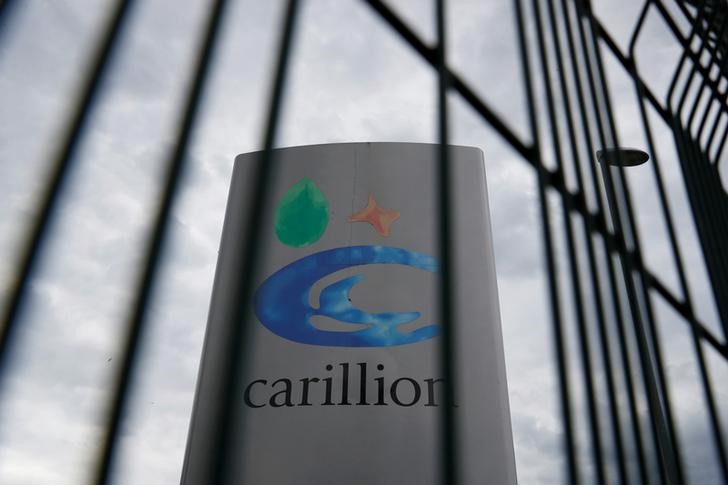By Esha Vaish
(Reuters) - Oxfordshire County Council, which last week ended much of a 10-year 500 million pound contract with Carillion , is now debating the future of a facilities management deal with the crisis-hit British construction firm.
"What we've discussed with Carillion (L:CLLN) is that we're going to review what's best," Alexandra Bailey, director of property, assets & investment at the council, told Reuters.
The council announced the terminated portions of its Carillion contract relating to parts of strategic asset management services as well as design and construction on July 11, however it kept the company on for facilities services such as catering and in-house cleaning.
Carillion revealed a 845 million pound writedown on July 10, prompting a profit warning and the exit of its chief executive. Carillion shares slid 3 percent on Thursday and have lost around two-thirds of their value over the past 10 days.
The company last week defended its ability to keep servicing customers and said it would engage in discussions with key clients. It won three government contracts this week, including two slots of work for Britain's High Speed 2 railway.
Carillion's problems echo those of Balfour Beatty (L:BALF), which went head-to-head with competitors to take on projects at wafer-thin margins during the recession. It later failed to meet savings targets or budget forecasts.
The company had high hopes for the Oxfordshire contract, saying last September that it had put forward extremely competitive prices to bid for the work and it expected that the council would use its services wherever possible.
Carillion, which has been increasing its exposure to support services, originally said the council had an option to extend the contract to 20 years and potentially assist it to secure work from other local councils and bodies within Oxfordshire worth up to 200 million pounds.
Of the terminated parts of the contract, the strategic asset management services will be transferred back to the council on Aug. 1. The design and construction element of the contract will be terminated at the start of September from when the council will procure those services externally.
A source familiar with Carillion's operations said that a contract review was typical after four or five years on long-term deals and such reviews could lead to an increase or decrease in the scope of contracts.
COMMERCIAL SENSE
The council said last week that it would exit a large part of its Carillion contract -- expected to be worth up to 500 million pounds over its 10-year tenure -- as the deal made less commercial sense now than when it was awarded in 2012.
The council estimated that the contract was worth 50 to 60 million pounds each year, implying Carillion may miss out on over 300 million pounds if it loses all the business.
It will cease carrying out strategic asset management services, which includes deciding what to retain and what to sell from county assets such as libraries, fire stations and children centres and services such as IT delivery, from August and stop carrying out design and construction from September.
"We looked at our Carillion contract and to be honest for now it doesn't quite fit," said Councillor Lorraine Lindsay-Gale, the cabinet member for property of the council, which did not incur any cost in ending the arrangement early.
"The sort of one-size-fits-all contract that we had with Carillion just didn't allow us to do that. The way that we are hoping to move forward would give us more freedom, more flexibility and enable us to get better value out of our portfolio."
Carillion declined to comment on the contract which was the largest of its kind in the UK when it was awarded.
Britain began outsourcing public services in the late 1980s under Margaret Thatcher's Conservative government and companies enjoyed a boom period during Labour leader Tony Blair's time as Prime Minister at the turn of the century, winning long-term contracts worth hundreds of million of pounds.
Many of the recent contracts have had tighter margins though as public bodies balance increased demands against tighter budgets.
The council said that it had begun looking at the contract nine months ago following cabinet changes and before the problems at Carillion surfaced.
Councillor Lindsay-Gale said the decision to end its exclusive relationship with Carillion had been "tactical", allowing it to keep essential services in-house and to have the freedom to outsource only what it needed to and to any partner of its choice.

"I suspect what you will see throughout the public sector is more and more people moving into positions like ours as they watch their policies in some of their markets," she added.